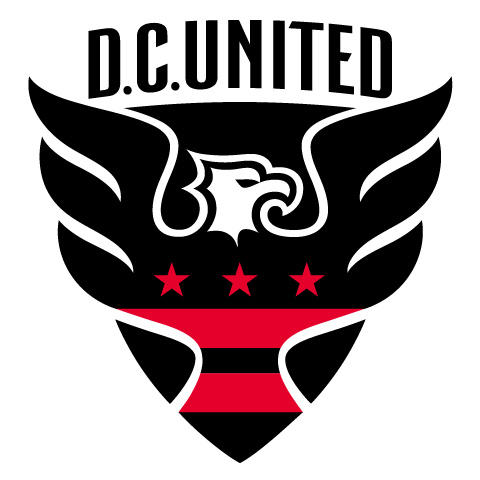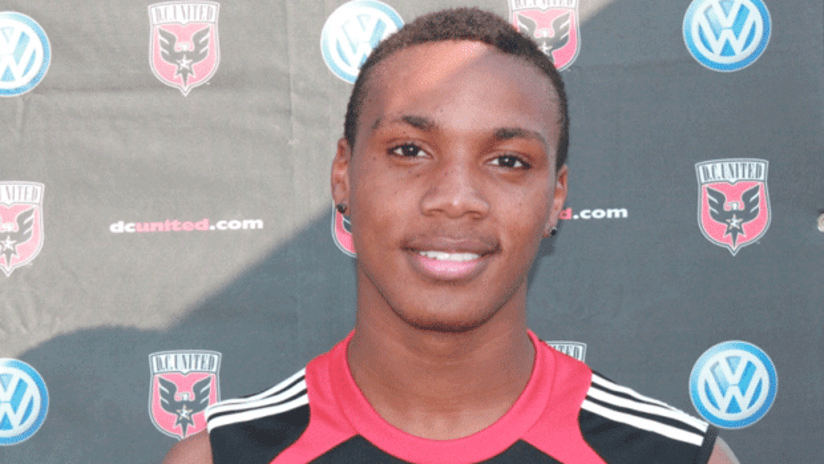So, how has your day been at school? Must have been a whirlwind.
Michael Seaton: Great! I think this is my last week of school, and then I’m going to start homeschooling.
Nice. Are you looking forward to that?
MS: Yeah, very much because then I can start on my new job.
Your new job as a professional soccer player? No big deal.
MS: Yes!
So, how does it feel to sign your first professional contract at 16-years-old?
MS: It feels great because it’s something that I have dreamt about. I set a goal at the beginning of the Academy year – I told my mom, ‘I’m going to go through every process. I’m going to go through the U-15s, go up one year and then never repeat a year.’ I told my mom exactly, ‘I’m going to become a pro at age 16, wrote it and put it under my pillow.’
When did this all go down?
MS: I did it when I first started on U-15s, which was like three years ago.
Have you told your friends about signing with D.C. United? What have their reactions been?
MS: I’m from down the street. I’m a Washington kid, a D.C. kid, so [my friends’] main thing is, like, basketball, football. But when I put the word ‘professional’ in there, the whole mindset changed and they figured out, ‘Ok, he’s doing a big thing.’ If you just say you’re a soccer player, they won’t care. But when I said ‘professional,’ my teachers’ reactions were crazy because in that school, I will be the only kid making it into something real big. So, they looked at me different and treated me very different. So, I like their reactions.
So, if most kids where you’re living play other sports, did you play other sports as well besides soccer?
MS: I played a lot of sports, but not on teams. I played basketball from time to time – I was very good at basketball. I played football with my friends around the neighborhood, but soccer is – I’m from Jamaica, so soccer is a big thing where I’m from, right? So, I just stuck with soccer and I’m actually good at it, so I just kept on going, kept on going and it got me to this point right now.
What was it about soccer that made you decide to pursue it besides it being an important part of your culture?
MS: Growing up poor, it gave me this energy to make other people’s lives better, like my mom and my little brother. I want him to go to school and just have a different life than me. I want his life to be way better than mine – my life is fine, but I want his life to be better. So, I want him to have a role model, which is me. I play soccer, right? And my father, he used to play on the Jamaican National Team, so I just kept the heritage going, just kept it going.
You’ve played with Jamaica at the U-17 level, but hold duel citizenship between the U.S. and Jamaica. Do you plan to remain with the Jamaican National Team, or would you considered representing the U.S. if called up?
MS: If I was given the chance with the U.S. for a cap, I would go. But at this point, it doesn’t matter what team I play for on the national team, as long as it’s on the international level and I’m not committing at this age, at this time. So, I’d rather just play for either country – I’d play for Jamaica, I’d play for the U.S., it doesn’t matter. As long as I’m playing soccer? Great.
Does your little brother play soccer, too?
MS: [Laughs] Oh man, [my brother] is just chubby. We want him to play everything. We actually want him to play baseball, but when his time comes, he’ll pick his sport.
How old is he?
MS: He’s five.
How has playing in the D.C. United Academy and Pre-Academy prepared you for what lies ahead with the first team?
MS: Very well because for one, coach Tom [Torres] – my favorite coach in the world – coach Tom, he told me that they’re trying to build character. But, I was so young that I didn’t want to hear anything. I didn’t listen, I didn’t get that picture at the right time. But when I went to Jamaica and came back to the Academy, I realized that they’re trying to build character. And it took me a long time to figure that out, but once I finally figured it out, it worked out for the best. So, the Academy worked on my character and everything.
What was it about that trip to Jamaica that sort of opened your eyes to that mindset?
MS: I got homesick. I really got homesick. But when I was down there, I just saw the struggle to do something that you love. I went down and I saw that I had it great – I had it good – in my life because a majority of them are not going to have the same life I have. ‘Cause if it’s a possibility for you to leave Jamaica and come to America – I had that opportunity, so I just had to grasp that opportunity and make something out of it.
Besides the emphasis on character, what kind of advice have your Academy coaches given you, in taking this next step?
MS: Be humble. Be humble. Don’t think I’ve made it yet. Keep working and just be humble, but at the same time, you have to work hard. That’s what they just told me. Work hard.
What would you say your greatest strength on the soccer field is?
MS: What exactly do you mean by that?
Do you feel like you’re the fastest, are you good at taking players one-on-one, do you feel like you have a great shot, etc? What do you bring to the table that you’re most proud about?
MS: I think all of the above, but that’s something that I have to work on a daily basis. Afterwards, I have to work on my left foot so much because that will make you a complete player. So, that’s what I have to work on as well – my left foot.
D.C. United homegrown players have contributed the most minutes on the first team than any other MLS teams’ crop of homegrown players. How does it feel coming into a professional team that really utilizes its former Academy players?
MS: It makes me very confident, kind of like ready to work because I’m going in knowing that my coach has a lot of confidence in me, in the game when he’s ready to put me in. And I have to show up. I have to show up. I have to show up.
Have you talked with Head Coach Ben Olsen yet?
MS: I did once. That’s when I went in for a meeting with all the coaches – my coaches, him and the general manager. He told me, ‘We use a lot of our young players in the game.’ And he was serious. He looked me dead in the eye. He was serious when he was talking. He was smiling because he was like, ‘At age 16? Wow, that’s crazy.’
What are some of your overall goals in your first professional season, besides staying humble and focused?
MS: Becoming a better person, on and off the field. I don’t want to change for anyone – I want to be myself ‘cause my friends, they always tell me, ‘Just be yourself because that’s what got you here.’ So, that’s what I just want to do – be myself and become the best player I’m going to be.
How does it feel getting the opportunity to play alongside someone like Dwayne De Rosario, who has had such an amazing MLS career?
MS: That’s going to be nervous at a point because I remember going into the meeting, I almost fainted! I couldn’t believe it, like I almost fainted. So, say I sit next to DeRo on a plane? I’m going to be speechless. But I think I can learn a lot from him. I can learn a lot from him. That’s what the coaches told me. He might pick on me at one point, but at the same time, he’ll look out for me.
How do you define success on the soccer field, for yourself? How do you know when you’ve done your best?
MS: Feedback. Feedback from people that’s watching, such as the coaches, the players and the fans. Especially my parents, because they’ll be watching the game. I’ll always ask them, ‘How do you think I played?’ If my mom says, ‘Great,’ then I think I’ll have played great.


